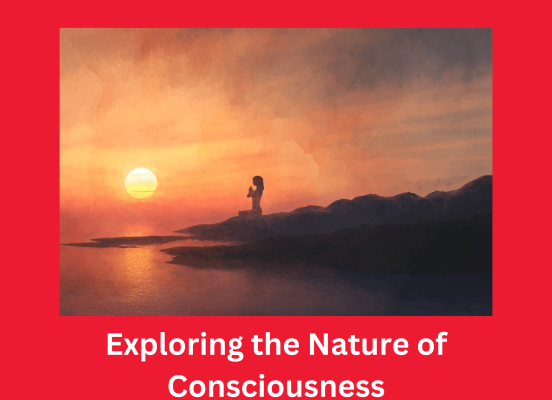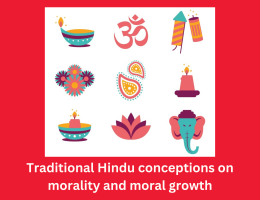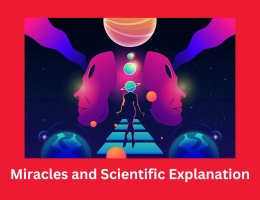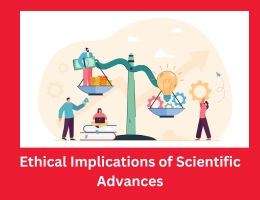
Exploring the Nature of Consciousness: Bridging Science and Spirituality
- By admin --
- Friday, 08 Mar, 2024
The nature of attention is one of the maximum large and enigmatic subjects in human history; it defies both theoretical and clinical interpretation. Between the concept of a supernatural writer and human thinking, there lies a complex net of philosophical dialogue, metaphysical supposition, and existential brooding about. We recall ideas from science and religion as we have a look at the complexities of awareness with a purpose to contribute to a more profound knowledge of the character of human existence.
It is tough to provide an explanation for recognition, that is sometimes described because the subjective recognition of oneself and the out of doors environment. Consciousness includes a large range of intellectual states and tactics that have an impact on our perceptions, mind, emotions, and behaviors, from the fundamental sense of being alive to the problematic enjoy of self-reflection and introspection. The enigma of attention, however, endures despite millennia of philosophical have a look at and clinical studies, defying conclusive answers and scary us to take into account the character of reality itself.
In order to understand the fundamental interest of nature and its relation to mind, scientists examine problem in its discreteness. In addition to advances in neuroscience, psychology, and cognitive age, scientists have made excellent progress in the knowledge of how the mind produces conscious experience, the construction of neural pathways image, and in thought, memory, and his own concentration.
Nonetheless, the elusive character of consciousness offers serious boundaries to scientific investigation, considering it is nevertheless uncertain how subjective stories result from the bodily features of the brain. The subjective components of conscious enjoy, or qualia, just like the flavor of chocolate or the coloration of a rose, stay a mystery that defies reductionist motives based totally on neural interest or computer algorithms. Similarly, the belief of focus itself, occasionally known as the "hard problem," poses critical queries concerning the character of thoughts-body verbal exchange and the connection among subjective fact and goal reality.
Contrary to the reductionist method of era, religious and non secular traditions provide exclusive perspectives on reputation, viewing it as an essential element of the human soul or spirit. Numerous theological cosmologies maintain that the universe's order, means, and causation are furnished through a transcendent author whose existence is focused on and arises from a divine supply. From a spiritual attitude, focus isn't always only a result of physiological features but also a mirrored image of the divine spark that every and anybody possesses, connecting them to the sacred coronary heart of lives.
The idea of a supernatural creator offers the look at of attention a further metaphysical depth and increases issues about the remaining genesis and fate of human cognizance inside the cosmic order. Theological reflection on the nature of the human soul and its relationship to the divine is primarily based on the perception in a non-public God who endows people with cognizance and unfastened desire in monotheistic faiths like Christianity, Islam, and Judaism. In these traditions, recognition—which gives people the ability for ethical reasoning, non secular development, and divine communion—isn't always most effective a mirrored image of God's picture and likeness however additionally a byproduct of biological evolution.
Still, there are theological and philosophical ramifications to the relationship between cognizance and a supernatural creator. Important questions on the character of divine providence and the reason of evil in a cosmos ruled by using a loving god are raised by way of the lifestyles of evil, struggling, and existential uneasiness. The conflict between human freedom and divine sovereignty also serves to spark theological debates about the extent to which attention is vulnerable to divine have an impact on or intervention, as well as the ramifications for moral duty and nonreligious duty.
Some pupils advocate for an integrative technique that bridges the gap among empirical research and metaphysical speculation that allows you to reconcile medical outcomes with non secular ideas on attention. This method, referred to as "neurotheology" or "spiritual neuroscience," recognizes the constraints of medical techniques in taking pictures the full spectrum of human spirituality and spiritual perception whilst simultaneously trying to research the neural underpinnings of non secular experiences, which includes meditation, prayer, and mystical states of focus.
Furthermore, the recognition evaluation forces us to see past dualistic frameworks that pit spirituality or religion towards purpose or technological know-how against information, spotting the innate complementarity of numerous tactics to information. Adopting a holistic perspective that mixes clinical statement with nonreligious knowledge permits us to expand a far better expertise of the mysteries surrounding interest and the complex relationships among all facets of human revel in.
In summary, the nature of consciousness remains a field of study that pushes the boundaries of the field and challenges us to explore the complexities of human existence. We can communicate the complexity of insight by combining scientific research, philosophical reflection, and spiritual reflection. This permits us to bear in mind the origins, mechanisms, and outcomes of attention for our expertise of reality and our vicinity inside the cosmos. We are asked to embrace the thriller of focus with humility, curiosity, and reverence in this in no way-ending look for reality and that means, acknowledging its big have an impact on on our perceptions, convictions, and desires.





